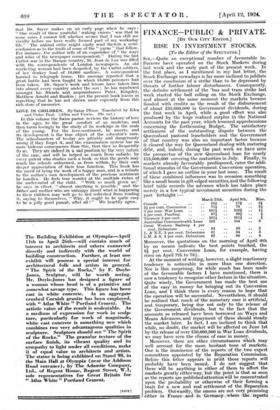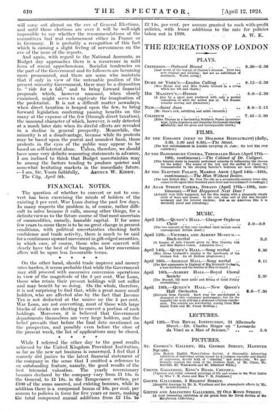FINANCE-PUBLIC & PRIVATE
[BY OUR CITY EDITOR.]
RISE IN INVESTMENT STOCKS.
[To the Editor of the SPECTATOR.] SIR,—Quite an exceptional number of favourable in- fluences have operated on the Stock Markets during last week and the early part of the present week. In the first place, as I mentioned in my last letter, the Stock Exchange nowadays is far more inclined tojubilate over the conclusion of a strike than to be depressed by threats of further labour disturbances. Consequently, the definite settlement of the 'bus and tram strike last week started the ball rolling on the Stock Exchange, and almost at the same moment the markets became flooded with credits as the result of 'the disbursement of about 135,000,000 in Government dividends, during the first week in April, while a good effect was also produced by the huge realized surplus in the National Accounts for the past year, which lessened apprehensions concerning the forthcoming Budget.' The satisfactory settlement of the outstanding dispute between the Queensland pastoral leaseholders and the Government of that country was also an 'important factor because it cleared the way for Queensland dealing with maturing debt, and, indeed, during the past week we have seen the prospectus of the new Queensland loan for nearly L13,000,000 covering the maturities in July. Finally, to markets already favourably' predisposed, came the addi- tional stimulus of the Government Conversion operation, of which I gave an outline in your last issue. The result of these combined influences was to occasion something like a small boom in gilt-edged securities, and the following brief table records the 'advance which has taken place merely in a few typical investment securities during the past fortnight :—
March 25th. April 8th. Rise.
Consols .. .. 551 .. 571 .. 21 31 per cent. Conversion 75} .. 78 .. 21 5 per cent. War Loan .. 1011 .. 102/ .. 11 4 per cent. Funding .. 87/ .. 88} ..
Treasury 5 per cent. 1011 , 1011
}-
Australian Commonwealth Loan 102 .. 104
Great Western Railway 4 per cent. Debenture • • • • 83 .. 86 .. 3 L. di N.E. 3 per cent. Debenture 61 .. 64 .. 3 L.M. & S. 4 per cent. Debenture 82 .. 86 .. 4
Moreover, the quotations on the morning of April .8th by no means indicate the best points touched, the 3i per cent. Conversion Loan, for example, having risen on April 7th to 78/. At the moment of writing, however, a slight reactionary tendency is noticeable in more than one direction. Nor is this surprising, for while much has been made of the favourable factors I have mentioned, there is now a tendency to recognize other factors in the situation. Quite wisely, the Government has made the best use of the easy in money for bringing out its Conversion Loan, and I think there is-every reason to hope that the operation will be successful. Nevertheless, it should be realized that much of the monetary ease is artificial, and temporary, being due not only to the release of the Government dividends, but to the fact that the amounts so released have been borrowed on Ways and Means Advances;and repayment of these should steady the market later. In fact, I am inclined to think that while, no doubt, the market will be affected on June 1st by the release of over £50,000,000 in War Loan dividends, we may have seen the climax of ease in money. Moreover, there are other . circumstances which may well account for the more hesitant tone of markets. One is the imminence of the reports of the two expert committees appointed by the R.eparation Commission. Before this letter appears in print those reports will probably have been issued? I do not suggest that there will be anything in either of them to affect the markets greatly either way; but the point is' that as soon as the reports are published attention will be concentrated upon the probability or otherwise of their forming a basis for a new and real settlement of the Reparation problem. • Outwardly, the omens are not very promising either • in France and in , Germany. ,where the reports will come out almost on the eve of General Elections, and until those elections are over it will be well-nigh impossible to say whether the recommendations of the committees find real endorsement either in France or in Germany. It is probably a recognition of this fact which is causing a slight feeling of nervousness on the eve of the issue of the reports. And again, with regard to the National Accounts, as Budget day approaches there is a recurrence in mild form of recent apprehensions. Socialist tendencies on the part of the Government and its followers are becoming more pronounced, and there are some who maintain that if only in view of the untenable position of the present minority Government, there may be a disposition to " ride for a fall," and to bring forward financial proposals which, however unsound, when closely examined, might serve to captivate the imagination of the proletariat. It is not a difficult matter nowadays, when direct taxation is heaped upon the few, to bring forward legislation conferring passing benefits on the many at the expense of the few (through direct taxation), the unsound character of which, however, is only detected at a much later date when its direful effects are revealed in a decline in general prosperity. Meanwhile, the minority is at a disadvantage, because while its .protests may be based upon the purest and soundest basis, those protests in the eyes of the public may appear to be based on self-interest alone. Unless, therefore, we should have some very definite reassuring statements in advance, I am inclined to think that Budget uncertainties may be among the factors tending to produce quieter and somewhat hesitating markets in the immediate future.











































 Previous page
Previous page